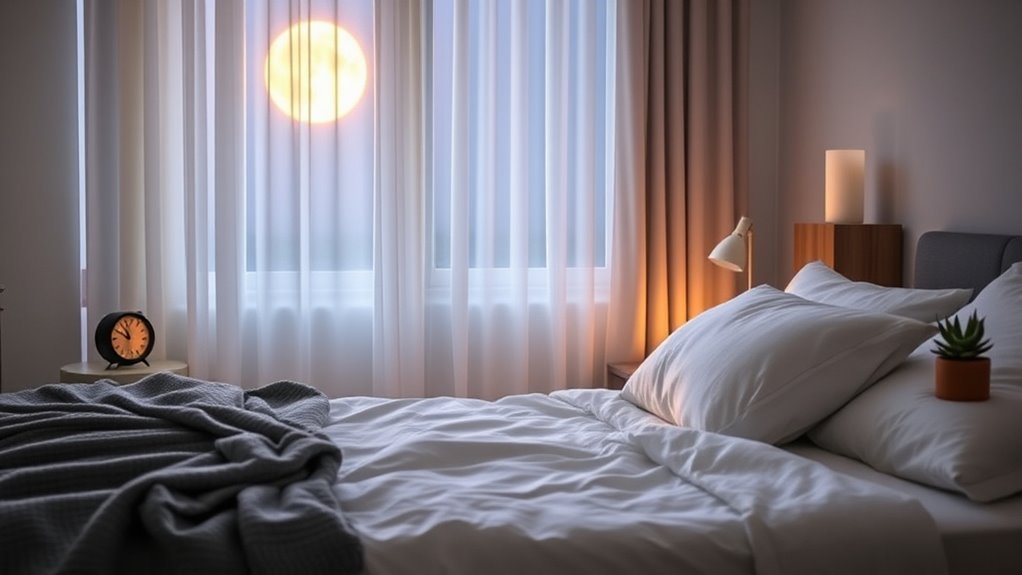After 40, good sleep becomes essential for managing stress and balancing hormones. When you get consistent, restful sleep, your cortisol levels stay in check, helping you relax and recover from daily pressures. Creating a calming bedtime routine, maintaining a cool, dark environment, and managing stress during the day all support better sleep quality. If you keep prioritizing these habits, you’ll discover how better sleep can profoundly enhance your stress resilience and overall health.
Key Takeaways
- Adequate sleep helps regulate cortisol levels, reducing stress and supporting hormonal balance after 40.
- Consistent sleep routines improve sleep quality, enhancing the body’s ability to manage daily stress.
- Relaxing pre-sleep activities promote relaxation, lowering stress levels and preparing the mind for restful sleep.
- A sleep-friendly environment minimizes disruptions, enabling deeper rest that aids stress recovery.
- Better sleep boosts immune function and emotional resilience, making stress easier to handle with age.

As you age beyond 40, managing sleep and stress becomes increasingly important for maintaining overall health and well-being. Your sleep quality naturally declines with age, making it harder to fall asleep and stay asleep through the night. Poor sleep doesn’t just leave you feeling tired; it can also disrupt your body’s delicate balance of hormones, especially cortisol. Cortisol, often called the stress hormone, follows a daily rhythm—peaking in the morning to help you wake up and gradually decreasing at night to prepare you for sleep. When your sleep is disturbed, this regulation gets thrown off, leading to elevated cortisol levels even when you don’t need them. Elevated cortisol can hinder your ability to relax, impair immune function, and contribute to weight gain. Hence, prioritizing sleep quality becomes a key factor in managing stress effectively after 40.
Managing sleep and cortisol levels after 40 is essential for lasting health and stress resilience.
Improving sleep quality isn’t just about getting more hours; it’s about making those hours restorative. Establishing a consistent sleep schedule helps your body set a predictable rhythm, supporting healthy cortisol regulation. Going to bed and waking up at the same time each day signals your internal clock to maintain a stable cycle, making it easier to fall asleep and wake up refreshed. Creating a calming pre-sleep routine—like reading, gentle stretches, or listening to soothing music—can also signal your body that it’s time to wind down, reducing stress and promoting better sleep. Reducing screen time before bed is essential, as the blue light emitted by phones and computers suppresses melatonin, the hormone that promotes sleep. Instead, opt for relaxing activities that help lower cortisol levels naturally. Incorporating relaxation techniques such as deep breathing or meditation can further enhance your sleep quality by calming the nervous system. Additionally, managing your environment by keeping your bedroom cool, dark, and quiet can significantly improve sleep quality and overall health. Creating a comfortable sleep environment is supported by proper bedding, which can help reduce physical discomfort and stress.
Your environment plays a fundamental role in sleep quality, too. Keep your bedroom cool, dark, and quiet to create an ideal setting for restful sleep. Invest in a comfortable mattress and pillows that support your body properly, as discomfort can increase stress and disrupt sleep. Managing stress during the day also influences your sleep quality; practices like mindfulness meditation, deep breathing exercises, or gentle yoga can help calm your mind, lower cortisol levels, and prepare your body for restful sleep. Incorporating top mattress toppers or other comfort solutions can enhance sleep quality further. When your sleep quality improves, your stress response becomes more balanced, allowing your body to recover and rejuvenate overnight. Over time, this positive cycle reduces overall stress levels, making it easier to handle daily pressures.
In essence, focusing on sleep quality and cortisol regulation after 40 isn’t just about avoiding fatigue—it’s about supporting your overall health, resilience, and well-being. When you prioritize restorative sleep, you enable your body’s natural stress management systems to function at their best, making it easier to face life’s challenges with energy and calm. Moreover, understanding the importance of hormonal balance can motivate you to adopt healthier sleep habits that contribute to long-term stress resilience.
Frequently Asked Questions
How Does Sleep Quality Change After Age 40?
As you age past 40, your sleep patterns often change due to age-related changes. You might find it harder to fall asleep, wake up frequently, or experience less deep sleep. These shifts can lead to feeling less rested and more stressed. Understanding these changes helps you adapt your routines, prioritize good sleep habits, and manage stress better, ensuring you still get quality rest despite age-related alterations.
Can Poor Sleep Directly Cause Increased Stress Levels?
Yes, poor sleep can directly cause increased stress levels. When you experience sleep deprivation, your body struggles to regulate stress hormones, leading to hormonal imbalance. This imbalance makes it harder to cope with daily stress and can heighten feelings of anxiety or frustration. Consistently poor sleep disrupts your body’s natural stress management processes, making it essential to prioritize quality rest to maintain emotional balance and overall health.
Are There Specific Sleep Disorders Common After 40?
You may notice that after 40, sleep disorders like sleep apnea and restless legs are common. Sleep apnea causes interrupted breathing, leading to poor rest, while restless legs create uncomfortable sensations that disturb your sleep. Both disrupt your sleep cycle, making it harder to relax and recover. Recognizing these issues early helps you seek treatment, improving your sleep quality, reducing stress, and supporting overall health as you age.
What Daily Habits Improve Sleep and Reduce Stress?
You can improve your sleep and reduce stress by practicing good sleep hygiene, like maintaining a consistent sleep schedule and avoiding screens before bed. Incorporate relaxation techniques, such as deep breathing or meditation, into your nightly routine. Regular exercise and limiting caffeine also help. These habits create a calming environment, making it easier to fall asleep and manage daily stress more effectively.
How Long Does It Take to See Stress Reduction From Better Sleep?
When you focus on sleep improvement, you may start noticing stress relief within a few days to a week. Your body begins to restore energy and balance, reducing cortisol levels and easing anxiety. Consistent sleep habits amplify these benefits over time. Keep in mind, individual differences matter, but with dedication, improved sleep can quickly translate into better stress management. Stay patient and persistent for the best results.
Conclusion
Just as the wise owl finds tranquility in the quiet night, prioritizing quality sleep after 40 can help you tame stress and restore balance. Remember, your body and mind are like a finely tuned instrument—when you give them enough rest, they play a harmonious melody. Don’t let stress steal your peace; embrace sleep as your secret weapon. By doing so, you’ll nurture resilience and find serenity amid life’s inevitable challenges.









